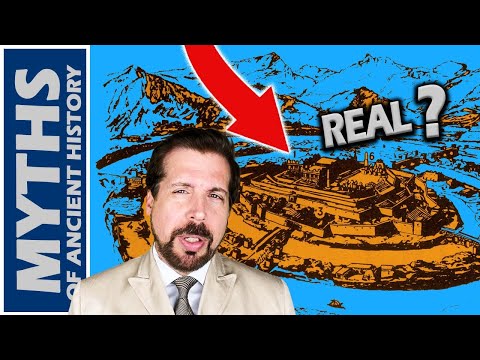Why I Don’t Believe in a Lost Advanced Civilization...Yet

For regular videos on ancient cultures and forgotten civilizations, please subscribe. I’ve been researching ancient history for many years and have changed my mind many times about events that did or did not happen. One of the keys to understanding our past is the ability and the willingness to go with the evidence wherever it takes us, whether it appeals to us or not, and to revise our beliefs with every piece of new evidence. I’ve done my best to do that over the years, and as an educator, I make it a point to keep my lectures updated, so that my students are not being given out-of-date information.
Some people claim that there are anomalies that don’t fit into the mainstream narrative about our past. They say it’s time that our history be rewritten, not just in the usual way it is every year, but in a major way, a complete overhaul, by inserting a whole new era of human history into the distant past, one that is just as long and complex as the history we are familiar with. I refer specifically to the proposal that thousands of years ago, before the ancient empires we know so well, before ancient Egypt, before the Sumerians, there was an advanced civilization, perhaps even greater than the civilizations we are familiar with, smack dab in the middle of the Stone Age, but that we’ve missed it, because it was so thoroughly destroyed in a terrible cataclysm that practically no record of it has been left. And I understand the appeal. I mean, wouldn’t it be cool if there is a whole period of ancient history that we are missing? Absolutely. That’s why they’ve made comic books and movies about it.
But is there really sufficient reason to believe in it? You may think so. I don’t. Now keep in mind that I am offering you my opinion based on what I have researched. You can take it or leave it. And in this video, I am giving you my general thoughts. If you want to get into specific examples, you can find videos in this series that will examine various claims in detail.
Right now, let’s just look at the basic ideas. I have to acknowledge that not everyone believes the same things about this proposed lost advanced civilization. Some attribute it to aliens, for example, while others simply to great humans of the past. But they do hold many ideas in common, which I think I can fairly summarize. Almost all of them equate this lost civilization with the Atlantis that is spoken about in Plato’s writings. In fact, “Atlantis” had become a shorthand name for this civilization.
Almost all of them perceive it to have been quite large, continent-spanning, in fact, on a scale approximately on par with the British empire. This idea goes back to the 1800s at least, but the main arguments for it never seem to change. Sadly, they never get any better or any stronger. This doesn’t mean that no new evidence is ever pointed out. Oh, new evidence is being presented all the time, but the arguments are the same, and it’s the arguments themselves that don’t ring true to me. Let’s consider the main ones.
One very common argument is that many artifacts and works of architecture (and they are almost exclusively made of stone, by the way) that are attributed to known ancient and medieval and even early modern societies are actually from this lost civilization, and that we know this because these artifacts or buildings are too impressive for them to have been made by those societies. What makes them too impressive? Their perfection or their weight. Perfection, meaning they are made so precisely, so accurately, that ancient people or ancient technology would have been unable to produce it. And weight, meaning that they are so heavy that ancient people or ancient technology would not have been able to move it. Now it seems to me that both of these beliefs underestimate the capabilities of ancient craftworkers and could only have been devised by someone with superficial knowledge of ancient societies and a limited understanding of physics. With all the talk of perfection and “precision stonework,” I have rarely seen more than just a small handful of measurements to establish this, and they are frequently done in a very casual, incomplete manner.
Most of the time, people just eyeball them and call them precise. But when talking about precision and accuracy, there is no such thing as an exact or perfect measurement. There is a number with an assigned uncertainty.
I almost never see those numbers. Next time you watch a video or read a book about a precision artifact, ask yourself, did they take these measurements in a scientific manner, did they take all the measurements - every angle and side, did they take measurements on all the pertinent objects, and did they show you all of these measurements? You will find the answer is usually no for every one of these questions. There is no way to make an assessment without this being done. No possible way.
I have never seen a measurement that is more accurate than what ancient people were able to achieve, and we know what they were able to achieve, because such accuracy was achieved by societies around the world throughout the ancient period, through the medieval period, and through the early modern period, before the Industrial Revolutions. There are thousands of examples. And there are thousands of modern experiments showing that it was possible. Now what about the weight of these artifacts? This is where physics comes in.
As any physicist will tell you, it is possible to calculate mathematically what can and can’t be moved with measurable forces and known tools. The math doesn’t lie, and with the tools and manpower the ancients had, objects weighing hundreds of tons could be moved. Yes, it would have taken time and money, but it could be done. And then add to that we often have documents from the time that testify to the fact of moving said objects or objects of equal or greater weight, sometimes great distances. So every time I see people oohing and ahhing over artifacts, because of their accuracy or their heaviness, it doesn’t make me doubt the abilities of the ancients.
It makes me appreciate their capabilities even more. Another common argument I often hear is the “it looks like it was done with a power tool” argument. When looking at marks made on various stones, people will reason that since it looks like those marks were made by a tool they are familiar with, a modern, it cannot possibly have been made by a tool they are not very familiar with, an ancient one.
But I have seen ancient tools make every single one of those types of mark. So this argument doesn’t hold any weight for me. The more one gets to know the ancient methods, and see them in action when people perform experiments, the less stock one puts in this argument. And keep in mind that this is an argument from personal experience, which can never be a strong basis for belief when we are considering cultures very different from our own. Just because you haven’t seen it before, that doesn’t mean it doesn’t exist.
Another common argument you will get is an appeal to myth. What? Yes. Appeal to myth. By myth, I mean traditional stories about the origins of things, which involve the supernatural. The reasoning usually given is that myths contain an element of historical truth, and myths often speak of primeval times, long ago, when the gods lived.
In their interpretation of these myths, the alternative history folks will substitute for these gods aliens or great humans, whom they say later people misunderstood as gods, and the societies these gods ruled over are interpreted to be part of a lost advanced civilization. While I do think it is reasonable to suppose that ancient legends, that is, stories that feature human characters, may have elements of historical fact in them, a problem I have with this kind of reasoning concerning myth, that is, stories of the gods, is that it doesn’t take the creators of the myths at their word. It ignores the genre of the writing, not understanding what myths were for or why they were composed.
It tries to turn a religious or sacred story into science. This destroys it. Additionally, there is no standard for how to interpret myth in this way. You can basically make it mean whatever you want it to mean. You can even disregard the time period that the ancients say the story takes place in. It’s mainly an imaginative undertaking.
It requires the doctoring of the story and of the material evidence found in the ground, to make it work. It’s like fitting a square peg into a round hole. In support of the claim that this lost civilization was quite large, that it existed all over the globe, alternative history proponents point to similarities they find in artifacts on different continents. So, for example, they might say, “Hey, look. Over here we have buildings that are bigger on the bottom than on the top, and over here we also have buildings that are bigger on the bottom than the top.
Over here we have polygonal masonry, and over here we have polygonal masonry. Over here, we have bumps on stones, and over here we have bumps on stones. These can’t be coincidences!” But when I look at these, I don’t see identical features. I see way more differences than I see similarities. And the similarities are always super generic.
They are not all that different from saying, “Hey, look. Over here we have standard masonry, and over here we have standard masonry. Over here we have stairs, and over here we have stairs.
These can’t be coincidences!” But you see, it isn’t unreasonable to suppose that humans in different parts of the world could come up with similar ideas, especially when practical, and when they do the same things differently, that tells me that more is being made of the similarities than is justified. Couple that with the knowledge we have that the artifacts are not contemporary (this is based on a significant amount of evidence), the tenuousness of these links become apparent. Links also are assumed between myths. You’ll hear people say, “Numerous cultures across the world have stories that share similar narratives.
A cataclysmic event destroying the population, followed by the rebuilding of society and the regaining of knowledge. Surely these can be traced back to an actual historical event.” But one of the things that I have encountered in my study of ancient peoples is the widely-held belief that natural disasters are punishments from gods for bad behavior. This is seen all through the ancient period. Every plague, every earthquake, every famine, every raging fire, every flood, every massacre was interpreted in this way.
So I had to ask myself, is it reasonable to assume that every earthquake story is about the same earthquake? That every plague story is about the same plague? That every flood story is about the same flood? No, it doesn’t seem so. The details have to match, and match in more than just general ways. Yeah, but aren’t there a ton of stories around the world that match Plato’s Atlantis story? No, there are not.
I can’t think of one. In order to make the claim that the Atlantis tale matches other stories, you would have to broaden the parameters so that the only similarity is a water disaster that kills a bunch of people. That’s pretty much it. You’d also have to eliminate the setting, because none of the dates for these disasters, when stories provide the dates, match.
It’s just too broad to be meaningful. Now people might be excited about new scientific studies coming in that seem to indicate that a comet impacted the earth some 12 or 13,000 years ago. Surely that must count for something! Even if there was a comet impact or some other huge disaster back then, that doesn’t establish that there was a lost advanced civilization.
All it would establish is that, if there was such a civilization, it would have been affected by it. I need to see the evidence for a lost advanced civilization, and so far, I haven’t. So why is there so much emphasis on a comet impact? Well, because ever since Ignatius Donnelly, it’s been part of the story, it’s the only part of the argumentation that has made it into peer-reviewed journals, and perhaps most importantly, it helps to make the theory unfalsifiable.
In other words, if it can be shown that a worldwide cataclysm occurred, that would explain why the remnants of this lost advanced civilization are gone. And so then when anyone objects to the claim of a lost civilization by asking for proof, it can be said, the proof has been destroyed. But falsifiability in science is essential, because scientific claims have to be testable. Okay, so those are the reasons I don’t think the arguments for a lost advanced civilization hold up. But I also have reasons against a lost advanced civilization, reasons why I think it is improbable. First, the complete lack of archaeological evidence for it.
Now some might say, “There is a ton of archaeological evidence: the Great Pyramid, Puma Punku, Baalbek, etc.” But all the archaeological evidence just steals from existing archaeology. It takes stuff that has already been firmly dated through several lines of corroborating evidence - and believe me, I’ve checked - and just claims it for its own theory.
Give me a new discovery. A new city. Something that isn’t sitting in the midst of somebody else’s culture. Well, what about Gobekli Tepe? It’s not from before this presumed comet impact, so how does that count? It doesn’t. So then it all falls back on the argument that the cataclysm wouldn’t have preserved anything.
That also I find hard to believe. We have an archaeological record stretching all the way back through the Stone Age, and everything in it, everything, falls along the line of technological progression. We have artifacts made of all kinds of materials besides stone: bone, wood, ceramics, etc. But none of it points to an advanced civilization.
And the only response I have heard to this is that all the cities would have been on the coast and a flood would have wiped them out before anyone could move inland. But the primitive settlements were inland, and that is why they survived. Set aside the fact that there is zero evidence for a catastrophic flood 12,000 years ago that would have wiped out every single coastal city in the world in the blink of an eye, the idea that advanced cultures form on the coast and primitive one inland is not supported by evidence. It’s just an imaginative way to get around the problem. When people in the ancient world settled, they wanted to be near freshwater sources. You can’t drink salt water.
And fresh water sources are found on rivers and lakes. Rivers and lakes don’t have to be near the coast. And if you consider that there are objects that these alternative history people attribute to the lost civilization that are not on the coast, such as the Sphinx or the pyramids or Puma Punku.
Their existence contradicts their own hypothesis. And also consider the fact that underwater archaeology is finding things off of coasts all the time. We’ve been finding stuff from Doggerland underwater, including tools. Where are the remnants of the cities? Show me the cities or anything from them. If there were a continent-spanning civilization, we should expect to find plant and animal species being exchanged.
After all, if there was communication and trade, there would no doubt be imports coming from other parts of the world. And yet the evidence points instead to geographical isolation of animals, of plants, and yes, of people. A big deal has been made of human genetic material recently being found that connects South America with Australia, but this does not point to contact between many parts of the world for a long time. We should have evidence of a considerable amount of genetic mixing, and we don’t.
The evidence points very clearly to notable genetic isolation. Then there is the complete lack of genetic or archaeological evidence for crop domestication and animal domestication, besides the dog, from those times. In fact, genetics is very clear that there was no livestock before the Younger Dryas period, nor was there genetic manipulation of plants. You can’t have an advanced civilization without agriculture. These reasons lead me to the inescapable conclusion not merely that the evidence for a lost advanced civilization in the Stone Age is lacking, but that it is improbable that such evidence will ever be found.
That being said, there is a way I think it is possible that evidence for a lost advanced civilization might be discovered. And that is if we lower our expectations. First, we would have to let go of the idea that it spanned continents. It’s just way too unrealistic.
And second, we would have to look for it after the invention of agriculture and animal domestication. If we do that, I think it is quite possible that a previously-unknown advanced (for its time) civilization could be found. In fact, I expect new cities to be found, entirely new cultures, probably within my own lifetime. And I look forward to it. If you want to get more into the details of this issue, check out my Myths of Ancient History playlist.
All kinds of videos are in it that dive into the particulars. I’ll leave a link for you. If you liked this video, give it a thumbs up. Thanks for watching. You might like my little e-booklet, Why Ancient History Matters.
It's designed to persuade people that the subject is important even in the modern world. You might also wish to use it to help spread the word. So feel free to share it with someone you know. It's free for anyone who wants it. I’ve left a link in the description box below the video for you to grab a copy.
Catch you later.
2022-03-29 01:34


